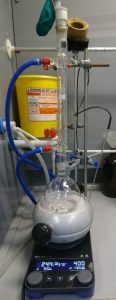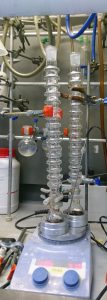September 19, 2019, by sustainablenottingham
Technicians and sustainability
Guest post by Lee Hibbett, Senior Research Support Technician in the School of Pharmacy.
I have worked for many years at the University in medicinal chemistry labs and I have always been passionate about sustainability. Unfortunately not much was done in my area on this until I was asked to join the University’s WasteNott working group, looking at ideas to reduce the impact of using plastic in the University – particularly from the lab side of things. This then led to the formation of the Technicians Sustainability Working Group (TSWG). This involved getting like-minded technicians from across all the University’s many campuses together, to find and look at ways of improving sustainability and sharing ideas.
We are starting off small, but we will hopefully go big.
- We are rolling out writing instrument recycling.
- Looking at turning down the -80oC freezers to -70oC (saving 25% in energy) and replacing old inefficient ones.
- Using Starlab’s TipOne system as the box, refill wafers and refill packaging can all go for recycling, reducing the amount of plastic sent for incineration.
- Looking at rolling out the LEAF green lab accreditation at the University, as a way of promoting best practices.
- We have installed 80 waterless condensers in five labs, which will save on water.
It is the waterless condensers I will now talk about to show how one change can make a big difference.

Water condenser

Waterless condenser
Saving water in a big way!
So what are waterless condensers?
Water condensers have been used in chemistry labs for decades and they are used for refluxing reagents at high temperature and stopping boil off. This is done by passing water through a jacketed glass column, cooling the vapour back into a liquid. This water just ends up down the sink!
The waterless condensers work by just the flow of air passing over the large glass surface area doing the same job as the water.
So what are the savings?
The amount of time the water condenser is used is around 16 hours per reaction*. So waste per week:
- 20 litres per hour x 16 hours per reaction = 320 litres of water per reaction
- 320 litres of water per reaction x 2 reactions a week = 640 litres of water
- 640 litres of water x 37 users = 23,680 litres of water per week being wasted
So per year:
- 23,680 litres per week x 52 weeks of the year = 1,231,360 litres of water being wasted every year
Therefore, as you can see one small change in the labs will make a big difference.
To find out more about the Technicians Sustainability Working Group please email lee.hibbett@nottingham.ac.uk
*Please note this was the minimal amount of flow needed to work and therefore higher amounts are to be expected.
No comments yet, fill out a comment to be the first

Leave a Reply